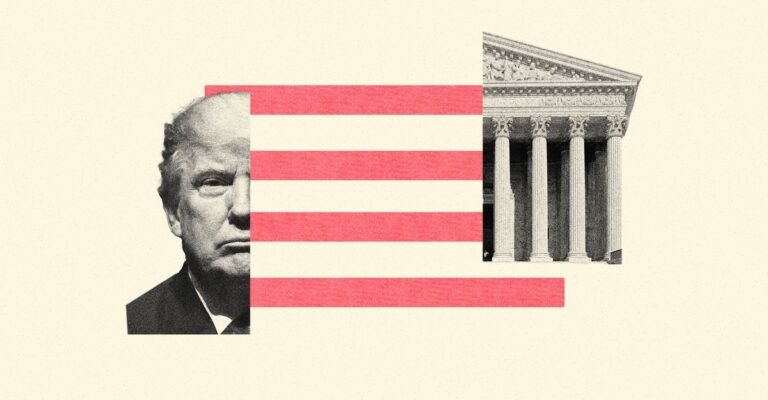
[ad_1]
It simply doesn’t understand how.

Two issues appeared clear after the Supreme Court docket heard oral arguments in Trump v. Anderson, the case regarding whether or not Part 3 of the Fourteenth Modification bars Donald Trump from the presidency as an insurrectionist. First, a lot of the justices need to rule in Trump’s favor. Second, they’re struggling to determine how to take action.
Perhaps Part 3 doesn’t apply to the presidency per se, Justices Neil Gorsuch and Ketanji Brown Jackson stated—and maybe, alongside those self same strains, it doesn’t prohibit oath-breaking former presidents from holding future workplace both? Or maybe, Justice Samuel Alito contemplated, the Fourteenth Modification prohibits insurrectionists from holding workplace, however not from working for it? Justice Brett Kavanaugh appeared enamored of the concept the modification doesn’t enable states to disqualify candidates for federal workplace—as Colorado did right here—with out Congress first giving the go-ahead. In a associated line of inquiry, which the justices appeared to coalesce round as arguments went on, Chief Justice John Roberts and Justice Elena Kagan advised that maybe there’s one thing inappropriate about permitting particular person states to make selections that might doubtlessly decide a nationwide election.
If these questions sound like they’re dancing round the principle level—whether or not the Fourteenth Modification prohibits Trump from a second presidential time period due to his position in encouraging his followers to violently assault the U.S. Capitol to be able to illegally maintain on to energy after dropping an election—it’s as a result of they’re. Throughout oral arguments that lasted about two hours, greater than 50 minutes handed earlier than anybody touched on the little matter of whether or not January 6 met the Fourteenth Modification’s commonplace for an “rebel.” (Based on Jonathan Mitchell, Trump’s counsel, it didn’t—although it was, he admitted, a riot that was “shameful, felony, violent—all these issues.”) That query, together with the associated query of whether or not Trump “engaged” in rebel underneath Part 3, went comparatively unaddressed for the remainder of the argument. At one level, the chief justice sounded bemused by the chance that anybody may anticipate him to adjudicate what did or didn’t represent rebel underneath the Fourteenth Modification.
When the Supreme Court docket first agreed to listen to the case, many onlookers predicted that the justices had been unlikely to uphold the Colorado Supreme Court docket’s ruling barring Trump from the state’s major poll, just because upholding the Colorado resolution could be such a momentous act. To state the plain, Anderson could be the first-ever occasion wherein a viable candidate for the presidency could be barred from the poll on the grounds that he participated in an rebel.
However the case additionally arrived on the Supreme Court docket’s door at a tough time for the justices. Public skepticism of the Court docket has grown intense following the Court docket’s latest sharp swing to the fitting and a string of unflattering press studies in regards to the moneyed, insular world that the justices—significantly the Court docket’s conservatives—inhabit. A ruling towards Trump would basically rid one get together of its most popular candidate, a drastic consequence that may thrust the Court docket even additional into the general public consciousness as a political actor (this although a ruling for Trump could be in some methods simply as political, and much more according to the presumed political preferences of the Court docket’s conservative majority). However however, judging by the justices’ skepticism of the arguments made by the counsel for respondents, Jason Murphy, they’re desperate to keep away from ruling towards the previous president.
That might be a lot simpler if the arguments towards Trump weren’t so overwhelmingly robust. A cautious research of the textual content and historical past of Part 3 reveals clearly that the supply was designed to guard American democracy towards exactly the kind of threat that Donald Trump represents. The justices have due to this fact been confronted with the choice of both following the Fourteenth Modification’s command and accepting the momentous consequence, or concocting some kind of escape route.
By the top of the listening to, it appeared just like the justices had been gravitating towards one doable avenue of escape: {that a} state shouldn’t, by itself, be capable to disqualify a candidate for federal workplace—wherein all the nation ought to theoretically have a say—underneath the Fourteenth Modification. Maybe a state may be capable to if Congress had handed laws permitting states to take such motion, but it surely hasn’t. And for that motive, the argument goes, Colorado overstepped.
If the Court docket takes this strategy, Trump’s title will nonetheless seem on ballots throughout the nation. However as a result of a call alongside these strains addresses solely the method by which Trump may be disqualified, not the substantive query of whether or not he’s truly disqualified, it may depart unresolved the underlying query of whether or not the Fourteenth Modification bars him from the presidency. As Murphy argued, pointing to an amicus brief filed by the longtime Republican election lawyer Ben Ginsberg and the legislation professors Edward B. Foley and Rick Hasen, this can be a recipe for potential catastrophe. It signifies that, if Trump wins in November, Congress itself might face the choice of whether or not to disqualify him when it counts the electoral votes—subsequent winter, on the sixth of January.
[ad_2]